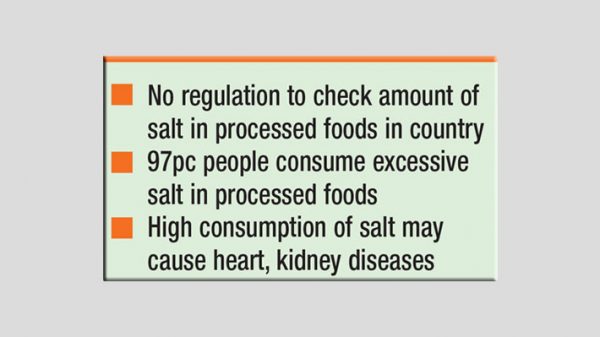High intake of salt affects public health

Shawdesh desk:
The excessive consumption of salt (sodium chloride) with regular and processed foods is affecting health of the people in the country, causing heart and kidney diseases.
According to the World Health Organisation (WHO), high sodium consumption and insufficient potassium intake result in high blood pressure and increase risk of heart disease and stroke. The main source of sodium in diet is salt.
“The high intake of salt causes non-communicable diseases (NCDs) like hypertension, cardiovascular disease and kidney diseases. Analysing different researches, it has been found that among the people of Bangladesh, the intake of additional salt is around 4 gram,” Prof Nazma Shaheen of Institute of Nutrition and Food Sciences at Dhaka University told the Daily Sun.
Mentioning that people consume excessive amount of salt through homemade cooked foods and Packaged Processed Food (PPF), she said, emphasising the need for consumption of salt on the WHO’s recommendations to prevent the NCDs.
A study conducted by the National Heart Foundation Hospital and Research Institute (NHFHRI) found that 97 per cent of people in Bangladesh irrespective of age group, residence and sex consume excessive salt though taking PPF for at least once a week.
Among the consumers of the PPF, 78 per cent consume biscuits, 53 per cent consume chanachur, 52 per cent noodles, 46 per cent chocolates, 45 per cent chips, 42 per cent cake and 31 per cent take bread.
It also found the scenario of excessive salt intake by children in the country is alarming as children consume the PPF more than 20 times a week in the country. Presenting the study report at a stakeholders’ meeting in the capital, Dr Sheikh Mohammad MahbubusSobhan, registrar (clinical research) of the NHFHRI, said on Sunday that testing 105 types of PPF at their lab, they have found excessive amount of salt in 62 per cent of the processed food.
The study also recommended adoption of a policy and regulation to set the maximum level of salt in PPF, adoption of reformulation of policy to reduce salt in common PPFs and to create mass awareness.
Speaking at the programme, AHM Shafiquzzaman, director general of Directorate General of Directorate of National Consumer Rights Protection, said regulation will have to be adopted to check the use of salt in foods, particularly in processed foods.
“At the same time, the food industries also will have to be compelled to give information about amount of salt in labeling of food packaging,” he added.
Talking to the Daily Sun, Prof Dr. Abdul Alim, member of Bangladesh Food Safety Authority (BFSA), said people will have to be aware of consuming salt and to avoid consuming excessive salt.
“There is no alternative to social awareness about excessive consumption of salt in foods. At the same time, regulation with fixing standard amount of salt is needed to check salt level in processed foods,” he added.
Enamul Hoque, deputy director at Bangladesh Standards and Testing Institution (BSTI), said a 15-member technical committee headed by BFSA member Abdul Alim has been formed to make a guideline about giving information on salt, sugar and fat in packaging of processed foods.
“We have also planned to check the salt level in the processed foods. But currently no action can be taken against use of excessive level of salt in the processed foods due to lack of legal framework,” he said.
The WHO said most people consume too much salt — on average 9–12 grams per day, or around twice the recommended maximum level of intake in the world while an estimated 2.5 million deaths could be prevented each year if global salt consumption were reduced to the recommended level.
It said salt intake of less than 5 grams per day for adults helps to reduce blood pressure and risk of cardiovascular disease, stroke and coronary heart attack. The principal benefit of lowering salt intake is a corresponding reduction in high blood pressure.
The WHO member states have agreed to reduce the global population’s intake of salt by a relative 30 per cent by 2025.























Leave a Reply